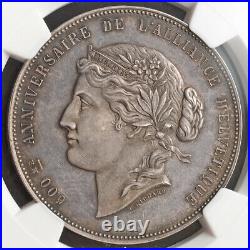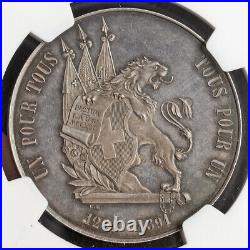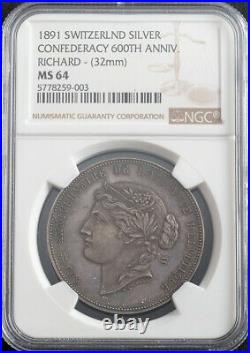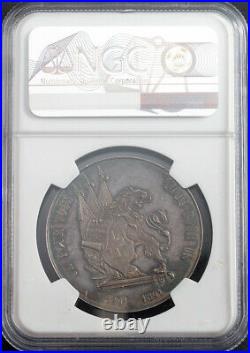1891, Switzerland. Silver 600th Anniversary of Swiss Alliance Medal. NGC MS64





Silver "600th Anniversary of Swiss Alliance" Medal. Mint Year: 1891 Medallist: C. Certified and graded by PCGS as MS-64!
Bulletin de la Société suisse de Numismatique 10 (1891) page 133, no 2. 600th Anniversary of the Eternal Alliance of the League of the Three Forest Cantons (the Federal Charger of 1291). The slab says 32mm, which is wrong!Obverse: Female head wearing wreathed diadem left. Legend: 600ME ANNIVERSAIRE DE L'ALLIANCE HELVETIQUE Translated. 600th Anniversary of Helvetic Alliance.
Reverse: Star above swiss shield seperating denomination (5-FR). One for all - all for one. The Federal Charter or Letter of Alliance (German: Bundesbrief) is one of the earliest constitutional documents of Switzerland.A treaty of alliance from 1291 between the cantons of Uri, Schwyz and Unterwalden, the Charter is one of a series of alliances from which the Old Swiss Confederacy emerged. In the 19th and 20th century, after the establishment of the Swiss federal state, the Charter became the founding document of Switzerland in the popular imagination.
The Charter documents the Eternal Alliance of the League of the Three Forest Cantons (German: Ewiger Bund der Drei Waldstätten), the union of three cantons in what is now central Switzerland. It is dated to early August 1291, which in the 20th century inspired the date of Swiss National Day, 1 August. Done in Latin, the Charter makes reference to a previous (lost or unwritten) pact.
It is now exhibited at the Museum of the Swiss Charters of Confederation in Schwyz. The Alliance was concluded between the people of the alpine areas of Uri, Schwyz and Unterwalden (homines vallis Uranie universitasque vallis de Switz ac communitas hominum Intramontanorum Vallis Inferioris). The participants are referred to as conspirati and (synonymously) coniurati, traditionally translated in German as "Eidgenossen" (and in English as "Confederates"). The Charter was probably intended to ensure legal certainty after the death of Rudolf I of Habsburg on 15 July 1291.
The first two paragraphs commit all three communities to the joint defence of the three valleys. The remainder of the Charter concerns judicial matters: It calls for arbitration in the case of conflicts, rejects foreign judges, establishes the death penalty for murderers and exile for arsonists, and commands obedience to judges and judicial verdicts., in its full name the Swiss Confederation Latin. Hence its abbreviation CH, is a federal republic consisting of 26 cantons, with Bern as the seat of the federal authorities.
The country is situated in western Europe, where it is bordered by Germany to the north, France to the west, Italy to the south, and Austria and Liechtenstein to the east. Switzerland is a landlocked country geographically divided between the Alps, the Central Plateau and the Jura, spanning an area of 41,285 km2 (15,940 sq mi). While the Alps occupy the greater part of the territory, the Swiss population of approximately 7.9 million people is concentrated mostly on the Plateau, where the largest cities are to be found. Among them are the two global cities and economic centres of Zurich and Geneva. The Swiss Confederation has a long history of neutralityit has not been in a state of war internationally since 1815and did not join the United Nations until 2002. It pursues, however, an active foreign policy and is frequently involved in peace-building processes around the world. Switzerland is also the birthplace of the Red Cross and home to a large number of international organizations, including the second largest UN office.On the European level, it is a founding member of the European Free Trade Association and is part of the Schengen Area although it is notably not a member of the European Union, nor the European Economic Area. Switzerland also has one of the world's largest account balances as a percentage of GDP. Zurich and Geneva have respectively been ranked as the cities with the second and third highest quality of life in the world. In 2010 the World Economic Forum ranked Switzerland as the most competitive country in the world, while ranked by the European Union as Europe's most innovative country by far. Switzerland comprises three main linguistic and cultural regions: German, French, and Italian, to which the Romansh-speaking valleys are added.
The Swiss, therefore, though predominantly German-speaking, do not form a nation in the sense of a common ethnic or linguistic identity. The strong sense of belonging to the country is founded on the common historical background, shared values (federalism, direct democracy, neutrality) and Alpine symbolism. The establishment of the Swiss Confederation is traditionally dated to 1 August 1291; Swiss National Day is celebrated on the anniversary. Silver 600th Anniversary of Swiss Alliance Medal.
NGC MS64" is in sale since Sunday, January 31, 2021. This item is in the category "Coins & Paper Money\Coins\ World\Europe\Switzerland". The seller is "coinworldtv" and is located in Wien. This item can be shipped worldwide.- Composition: Silver
- Country/Region of Manufacture: Switzerland
- Certification: NGC
- Denomination: Medal
- Grade: MS 64
- Year: 1891
